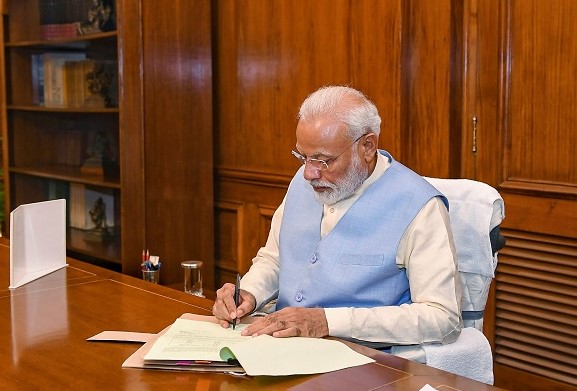
Not many — least of all myself — predicted the thundering victory of Narendra Modi in the recently concluded general elections.
I travel a lot in India and my feeling, in the last two years, has been that many of the PM’s remarkable and absolutely needed reforms do not fully reach the grassroots.
His Swachh Bharat movement, for instance, something so visionary in its simple endeavour, has petered out in many places. In Bangalore, for instance, contractors paid by the government to pick up trash, dump it at night in deserted places like the Kanakapura Road.
Banking has become more and more difficult, and private banks are using the KYC (Know Your Customer) to make the life of honest ordinary people miserable. Investment remains mired in red tape and bureaucracy (hence the bad economic data, which came out after elections!). Visas, which are supposed to be given more freely, have become a nightmare, particularly business visas: If you do not make rupees one crore turnover every year and miss by a few lakh you get blacklisted — ask the French community of Pondicherry.
Why are Modi’s reforms not fully percolating down? The answer in one word is — bureaucracy. The middle and lower bureaucracy feel instinctively that the PM’s reforms will render them somehow redundant and they are actively resisting change. Hence cheating and corruption, have in my opinion, not gone away at all.
Also, one should note that the BJP is functioning in a system established by 50 years of Congress rule. The VVIP culture, which Modi tried to break in the first two years, but which many of his ministers have happily settled into — the PA’s, PS’s, circles around ministers, which make it virtually impossible, even for a person with genuine work, to get through to them; the immense power that politicians wield, which often goes to their head, even when they start with goodwill.
The past five years of Narendra Modi have no doubt been remarkable, but he has not touched some of the core pledges he made in 2014 while campaigning: A Common Civil Code, Article 35-A which allows Kashmiri Muslims to settle all over India, but not Indians to settle and work in Kashmir; the Ayodhya Ram Mandir, which is a rare and absolutely justified aspiration of Hindus; the government take-over of Hindu temples — but not of churches and mosques and the rewriting of Indian history books, among others.
Many have said that the PM would tackle these during his second term. But will he? Touching education and rewriting curriculums, will provoke a huge outcry among ‘minorities’. Yet, history is not told as it has happened and tyrants like Aurangzeb occupy a prime place, while true heroes such as Shivaji Maharaj, Maharana Pratap or Ahilyabai Holkar remain in the shadows. As a result, Indian children do not grow up proud of their history or culture and only cricket unites them.
If the first month of Modi’s new mandate told us something, it is that he will concentrate on the economy, external affairs and social reforms. Thus the establishment of a Hindu Rashtra will remain a far dream – in fact, I doubt very much it is on the prime minister’s agenda.
His first declaration after his landslide victory was symptomatic; he used the word ‘inclusive’, which means that like in the first term, Modi will keep reaching out to the ‘minorities’. Nevertheless, it will make no difference to the foreign press; The New York Times, the French Le Monde, CNN, the Time magazine, the English Guardian, who have painted the prime minister and the BJP as divisive, anti-Muslim, right-wing, dangerous etc. Is the BJP in the process of becoming the new Congress of India – being so dominant that it will get institutionalised?
Well, another of the inheritances of the Congress is a highly centralised system, where everything is decided by one man or one woman sitting in Delhi, as in the case of Sonia Gandhi, who was just an elected MP but ruled India, over the head of the real PM, Manmohan Singh.
PM Modi appears more and more like a one-man show, who decides everything, like an unchallenged emperor. Thus, he needs to decentralise. My advice would be in the first stage to move his government from time to time to different locations where the BJP is in power, to Mumbai for instance, or Bangalore eventually when the BJP takes back chief ministership.
It will be lighter baggage, as the whole Delhi bureaucratic apparatus will not be able to move with him and in this way, he will get closer to the people. In the long run, a new capital needs to be built in a more central place, like Pune — and the bureaucracy needs to be pruned heavily.
There is no doubt that Modi is something of a yogi and the leader that India has been waiting for 80 years. Nevertheless, the question remains: During the next five years, will Modi become the unchallenged emperor of India or continue to be a ‘servant of God’ to implement Swami Vivekananda and Sri Aurobindo’s vision of a dominant Bharat, spreading its ancient knowledge that the world needs so badly: ‘Who am I, what happens when I die, why am I reborn, what is karma, what is dharma, what are the yogic tools to lead a better life’….
